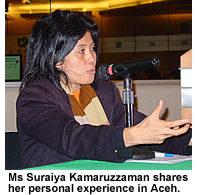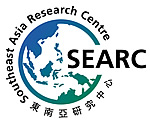Reviewing Aceh's social issues after the tsunami
Over 120 people from the community gathered at CityU, 30-31 January, for a public forum organized by the Southeast Asia Research Centre (SEARC), to learn about Aceh's social issues arising from last December's tsunami.
The forum began with an overview of the situation in Aceh presented by Dr Vivienne Wee, Associate Professor in the Department of Applied Social Studies and Associate Director of SEARC. Dr Wee covered the general conditions for the tsunami survivors, relief activities and the role of civic groups in Aceh. Ms Suraiya Kamaruzzaman, an Academic Visitor at SEARC, shared her personal experience of helping her relatives and friends in Aceh cope with the disaster.
“The tsuami totally devastated Aceh; buildings and villages were destroyed, numerous corpses were found on roads, missing persons notices were posted everywhere, displaced people desperately sought shelter…” Ms Kamaruzzaman showed the audience the pictures she took in Banda Aceh, capital of Aceh, and talked about what she saw and heard there. She showed the forum audience a local Aceh newspaper, in which photos of the missing are published daily. One of Ms Kamaruzzaman's friends was on the list. “After the tsunami, while survivors are trying to leave the place, many others are trying to get to
Neglected victims
Ms Kamaruzzaman pointed out that very often women, children, the elderly and the disabled are deprived of aid or resources. Some women have to give birth or breast-feed babies in unsanitary conditions. Many children have no clothes to wear. As founder of Flower Aceh, a voluntary organization in support of women, Ms Kamaruzzama introduced their work and appealed to the general public to lend a helping hand to these vulnerable people.
Two other speakers were invited to provide supplementary information at the forum: Ms Lin Chew, another Academic Visitor in SEARC, introduced the work of an international funding agency, the Global Fund for Women, for strengthening women's groups in Aceh; Mr Y K Fong, Vice-Director and Chief Editor of the Hong Kong China News Agency, talked about the situation of the Indonesian Chinese in Aceh.
Launched in February 2001, CityU’s Southeast Asia Research Centre is the first research centre in
In addition to this public forum, CityU, in conjunction with UNICEF, raised a record amount of donations, over HK$350,000, in support of the tsunami disaster victims of South Asia.


